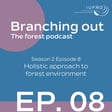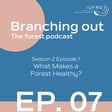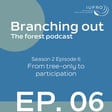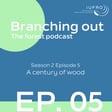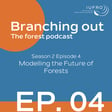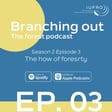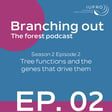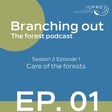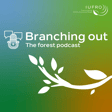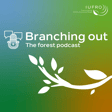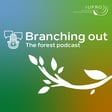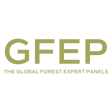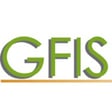Become a Creator today!Start creating today - Share your story with the world!
Start for free
00:00:00
00:00:01

IUFRO-SPDC (interview with Michael Kleine) - by the International Union of Forest Research Organizations
Originally published on 1 June 2010, during this podcast, Tarun Bathija interviews Michael Kleine (IUFRO-SPDC Project Coordinator) to get a better understanding of the International Union of Forest Research Organization's - Special Program for Developing Countries. The mission of the Special Programme for Developing Countries (in short IUFRO-SPDC) is to expand and foster forest research capacity in developing and economically disadvantaged countries. According to the programme's strategy for 2007 to 2010 the IUFRO-SPDC activities cover the following five priority areas:
- Enhancing core scientific competence
- Improving information management and dissemination
- Enhancing science contribution to policy processes
- Promoting communication and multi-stakeholder learning processes
- Providing institutional support to regional forest research networks
Transcript
Introduction to EUFRO Podcast
00:00:11
Speaker
Hello and welcome to the EUFRO podcast. I'm Tarun Batija from the headquarters of the International Union of Forest Research Organizations in Vienna, Austria. Today I'd like to do a podcast on SPDC, the EUFRO special program on developing countries.
Purpose of SPDC Program
00:00:28
Speaker
And with me is Michael Kleider, who is the coordinator. Hello and welcome. Hello.
00:00:35
Speaker
Maybe we can start by just going over the general objectives of SPDC and perhaps you can just explain to us a little more about them. UFRA SPDC is a long-term program of UFRA with the objective to expand research capacity in developing countries.
00:00:54
Speaker
We are concentrating on enhancing core scientific competence of the research community, dealing with improving information management and dissemination of scientific information, enhancing science contribution to policy processes, and of course, promoting communication and multi-stakeholder learning processes within the science community as well as between the science community and stakeholders. And is there anything more specific in the goals?
SPDC Initiatives and Activities
00:01:23
Speaker
Yes, our activities are mainly concentrating on training workshops for scientists in developing countries. Then we do collaborative research networking projects, writing books together, doing scientific projects, mainly synthesizing information and publishing them. And we have got a scientist assistance program to enable scientists to join scientific meetings of UFO and UFO conferences and conferences.
00:01:51
Speaker
As we know that 2010 is the year for Congress in August. So are there any major activities in this preparation or disregard?
00:02:00
Speaker
U4SPDC is involved in the Congress 2010 in Korea by organizing a pre-Congress training workshop event. These are actually training workshops, four training workshops running concurrently at a training center near Seoul in the week before the Congress, offering several training workshop modules. What does a typical workshop look like?
00:02:29
Speaker
Well, the workshops concentrate on important topics for the science community, where Yufu has been involved over the last couple of years, for example, forests and climate change, or forests and water interactions. Another topic is traditional forest knowledge, as well as forests and human health. So such workshops are offered, including some technical skills in the science policy interface and information management.
00:02:59
Speaker
How does maybe give us a general daily schedule? How would it
Workshops and Training Details
00:03:04
Speaker
go?
00:03:04
Speaker
Yeah, these workshops as pre-congress training events are organized in one week. So we bring people to one training center. We have a big accommodation there. So people are staying the whole week for the whole week. And there is a lot of interaction. There are training sessions. There are joint field walks.
00:03:29
Speaker
near the training center, discussion sessions, as well as the big knowledge cafe, which is then closing the entire event where all the participants are interacting and exchanging their knowledge. So there's a lot of interaction going on. A lot of interaction, which is the major objective of this workshop, to get to know people, to maybe organize and plan for collaboration in the future, so that there is really an
00:03:58
Speaker
inter-regional and inter-regional cooperation within as a consequence of these workshops. Okay, great. And we know that generally developing countries do not have many funds available. So how is this managed overall?
Funding and Support for Scientists
00:04:15
Speaker
Yeah, the program, the U4SPDC program, mobilizes funding from international donors, for example, from Finland or from the United States.
00:04:23
Speaker
or from the AU or even from Korea and other donors and we use these funds on one hand to organize training workshops where all the expenses of travel, training workshop, training faculty and inputs are provided by us.
00:04:40
Speaker
Or we are using the funds to provide travel grants to scientists to go to UFO meetings and UFO conferences so that scientists have the chance to present their scientific results as well as network with other scientists and in this way improve forest research.
00:05:03
Speaker
Who is your main target audience or who are the participants of these SBDC workshops?
Target Audience and Focus Areas
00:05:09
Speaker
Our main audience are scientists, that means early and mid-career scientists, the younger scientists, who have been starting their work in forest research in developing countries.
00:05:22
Speaker
but who want to enhance their knowledge and their experience. So these are more the early and mid-career scientists we are trying to bring into our workshops and training events.
00:05:34
Speaker
What are the priorities for SPDC in the next years? Well, we so far have concentrated on skills like information management, like dissemination of information, but also on core competencies in scientific work like research methods, proposal writing. These are skills all scientists need. It doesn't matter if they work in genetics or in soil science or even in social sciences.
00:06:04
Speaker
We will definitely continue to enhance and to promote these basic skills, but we will further continue to concentrate on priorities like forest and climate change, forest and water interaction. So the trainings workshop we are doing now at the Congress
00:06:22
Speaker
and try to further develop them even with CDM projects or carbon sequestration or even red mechanisms, so important topics that are relevant for the international but also for the national forest policy. What would you tell to the mid-career scientists or the participants or those who are interested in SPDC in Latin America or Africa or Asia? What is your main message to them?
Encouragement for Scientific Contribution
00:06:51
Speaker
My main message to scientists joining our trainings would be that they need to make a meaningful contribution to development and to also forest development in their own countries. For that purpose they need not only scientific skills to produce scientific results but also skills of dissemination of the results
00:07:11
Speaker
convincing stakeholders, convincing policymakers on new developments in forestry and the potential for social development. So this I think is the major message I would give them. Well, thank you very much for being here with us. Thank you for being here. Hopefully you listened to some more podcasts and stay tuned and visit www.euchro.org.

